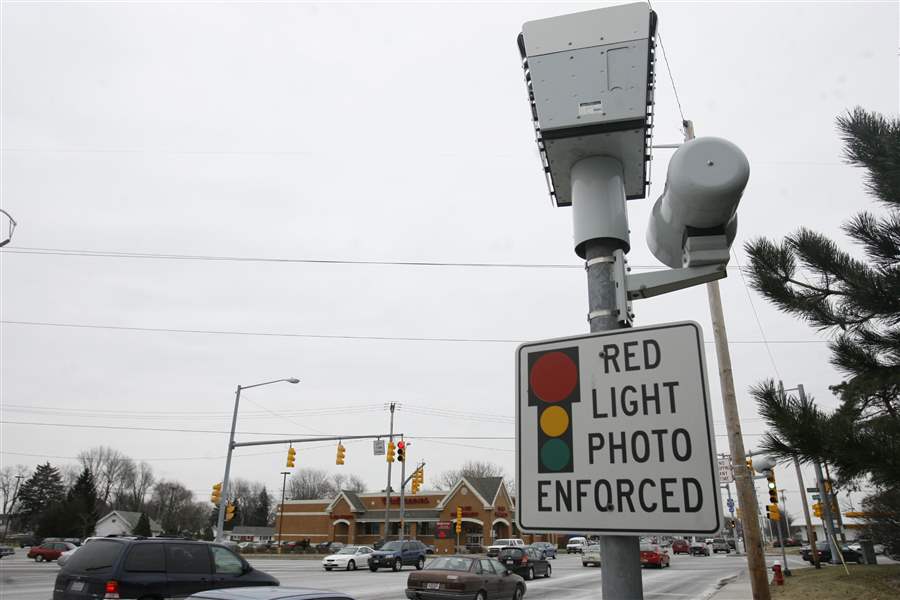
RED-LIGHT CAMERAS
City wins challenge of state traffic law
7/9/2016
Red-light cameras such as this one on the south-bound corner of Secor and Monroe Streets have been the focus of legal appeals.
THE BLADE
Buy This Image
Toledo prevailed Friday in its ongoing battle to operate traffic cameras without financial penalties from the state, but the legal question is far from settled.
In a 2-1 decision, Ohio’s 6th District Court of Appeals upheld Lucas County Common Pleas Judge Dean Mandros’ finding that restrictions the Ohio Assembly placed on cities that use red-light and speed-enforcement cameras were unconstitutional because they violate Toledo’s home-rule powers.
Among other things, the law requires that a police officer be present at all times when a traffic camera is in use. The state legislature subsequently said any city that disregarded the camera law would have the amount of the gross fines billed from its cameras deducted from its share of local government funds.
“While the state now claims that its overriding state interest is to provide uniformity in the use of those automated enforcement systems, in its own words, the legislature’s intent in enacting [the law] was ‘to establish conditions’ for the use of such devices,” Judge James Jensen wrote in the opinion that was affirmed by Judge Arlene Singer.
“Those conditions actually render it impractical and cost prohibitive for most municipalities to use photo-monitoring devices to continue to enforce traffic laws in a manner that the Ohio Supreme Court has already deemed permissible.”
Judge Singer wrote separately that she did not consider the practical and financial effects of the law.
She instead found those portions of the law unconstitutional because they are “directed at a municipality that utilizes traffic photo-enforcement devices, rather than toward citizens generally.”
Judge Stephen Yarbrough dissented.
The law, he wrote, “does not single out a small group of municipalities for regulation” but “sets forth statewide procedures and regulations to be followed by any municipality wishing to implement the use of traffic cameras.”
Judges Jensen and Singer acknowledged that their decision was in conflict with a ruling by the 2nd District Court of Appeals in regard to the same question posed by the city of Dayton.
The appellate court will certify the case “for review and final determination to the Supreme Court of Ohio” on the home-rule question.
Toledo City Law Director Adam Loukx said he was hopeful the state’s high court would agree with the 6th District Court of Appeals.
“The majority affirmed the very strong opinion by the trial court,” he said. “It’s the right result. We’re pleased, and obviously the city is paying attention to the cases pending in the Supreme Court.”
Toledo Mayor Paula Hicks-Hudson also was hopeful.
“This allows us to be able to hold that line,” she said. “To me, it’s always been about safety and home rule.”
Dan Tierney, spokesman for Ohio Attorney General Mike DeWine, said the Supreme Court will decide the issue once and for all.
“We’ve been anticipating that this decision would be ultimately made by the Ohio Supreme Court so the 6th District decision doesn’t change that,” he said.
Last year, a Montgomery County judge ruled similarly to Judge Mandros that portions of the law were unconstitutional because they violated Dayton’s right to home rule, but Ohio’s 2nd District Court of Appeals overturned the decision in August.
Dayton appealed to the Ohio Supreme Court. Toledo, Springfield, Akron, East Cleveland, and the Ohio Municipal League all filed briefs in support of Dayton.
Mr. DeWine’s office argued in a brief that Ohio’s Home Rule Amendment gave municipalities “the power to establish internal government structures, but not the power to regulate the citizenry in a way that conflicted with the General Assembly’s choices.”
The attorney general’s office contends the question before the court has nothing to do with whether the cameras are a good or a bad idea.
“Instead, this case involves a legal debate about the Home Rule Amendment, which grants to municipalities unconditional ‘self-government’ powers, but only conditional ‘police’ powers that give way whenever the General Assembly enacts conflicting ‘general laws,’ ” the brief states.
Blade staff writer Ignazio Messina contributed to this report.
Contact Jennifer Feehan at: jfeehan@theblade.com or 419-213-2134.